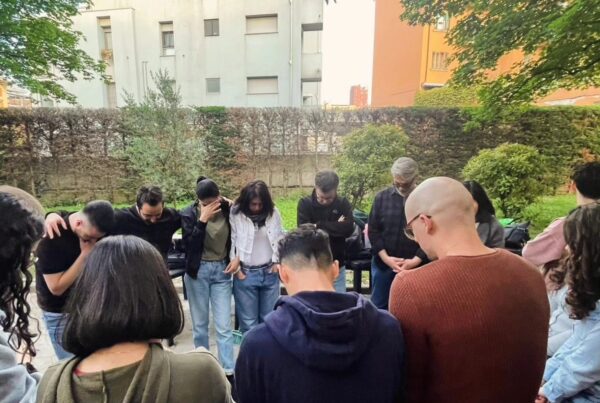Around 600 BC, as the prophet Jeremiah foretold, many Israelites were forcefully carried off to Babylon, and Jerusalem was destroyed. Jeremiah tells the soon-to-be exiles that YHWH’s works would unfold gradually through multiple generations (Jer. 29).
These words remind me that we must have a marathon mentality.
Marathon missiology is imperative—especially in more challenging contexts—because a new church plant won’t instantly overcome decades of neglect and gospel absence. Many fall before the finish line because they view the mission as a sprint. But Paul describes church planting as a relay race: “What you have heard from me in the presence of many witnesses, commit to faithful men who will be able to teach others also” (2 Tim. 2:2).
Paul’s instructions to Timothy sound similar to Jeremiah’s words centuries before. Church planters should embrace a marathon approach to see sustainable multiplication in the cities God places us. And we must be aggressively engaging, not just passively present, in these places.
How to Live in Paradox
When we began planting Cornerstone Church in Detroit, Michigan, we wanted to become woven into our community while still reflecting the unique, radiant glory of Christ. Our relationship with our city is paradoxical. We’re called to shine gospel light and display Christlike distinctiveness (Matt. 5), but also to live among God’s enemies. Just like God’s people exiled to Babylon, we’re called to be near those who are far from the Lord.
Marathon missiology is imperative—especially in more challenging contexts—because a new church plant won’t instantly overcome decades of neglect and gospel absence. Click To TweetHow, then, can we live faithfully in this paradox of being among but not like our neighbors? We can intercede for, immerse ourselves in, and invest in the welfare of our cities.
1. Intercede
Even though Israel’s captivity is a result of God’s judgment, God tells his people to call out to him and “pray to the Lord on [Babylon’s] behalf” (Jer. 29:7). Shockingly, God instructs his people to intercede for the city that would later personify evil in Scripture (Rev. 18). We, too, should be calling out to God for our city, “for when it thrives, you will thrive” (Jer. 29:7, CSB).
Intentionally pray for God’s hand of salvation and his common grace in your city; it will glorify him and cause you to thrive. Scripture and human history give countless examples of God moving when his people pray fervently to him.
I’m often reduced to tears driving and walking the streets of Detroit. Seeing the crime, poverty, and homelessness compels me to intercede for my city. But it’s not just personal. We also pray publicly for Detroit during our church’s corporate prayer. We pray for city leadership, the schools we serve and their families, an end to violence, for specific neighborhoods, other churches, and for revival. How are you interceding for your city?
2. Immerse
The Lord instructs his people to, “Build houses and live in them; plant gardens and eat their produce. Take wives and have sons and daughters . . . multiply there, and do not decrease” (Jer. 29:5–6). This is shocking when we remember the wickedness and idolatry of Babylon. YHWH tells his people to get comfortable being uncomfortable. They’re to plant roots in Babylon’s polluted soil. Of course, they’re not to imitate Babylon’s sin. But God tells them to fully immerse themselves in the city for the city’s good.
Sometimes we develop Christian subcultures and avoid thoroughly planting our lives where we minister. But instead of existing as a separate entity, we want to be part of our community. In 1 Peter 2:11–12, the apostle refers to us as “strangers” and “exiles” but still encourages us to live God-glorifying lives among godless people, not to separate ourselves from them.
In your philosophy and practice, construct your life and ministry so it’s interwoven with the city where God has placed you. As much as possible, live, eat, work, and play where you are seeking to reach people. Many view this as a sacrifice because it means giving up geographic and social advantages, but it pays major missional dividends. I encourage you to think and pray through ways to relish the common grace in your city while declaring Christ’s saving grace. Our engagement in our cities displays the person, incarnation, and work of our Savior. Click To Tweet
3. Invest
God tells Israel to “seek the welfare of the city where I have sent you into exile” (Jer. 29:7). Our church has partnered with schools, civic organizations, local businesses, crisis pregnancy centers, and sports leagues in the past five years. We aim to see our neighborhoods flourish. By God’s grace, we’ve developed a reputation as a church that pursues the city’s well-being. We tirelessly serve, and we invest financially.
There are countless ways our churches can invest in the human flourishing of our cities without compromising gospel distinctiveness. As an example, in 2019, I visited our neighborhood school’s PTA—despite having no children enrolled there—and now serve as an unofficial chaplain and counselor.
Our engagement in our cities displays the person, incarnation, and work of our Savior. Our immersion in our cities and sacrificing of our comforts points to how the Lord left heaven’s majesty for earth’s mess because of his great love for us. Our investment in our cities directs people to Christ, who paid it all at Calvary. With a marathon mentality, we can face hardships and difficult people for our city’s good because our Holy Jesus died to redeem his enemies.










